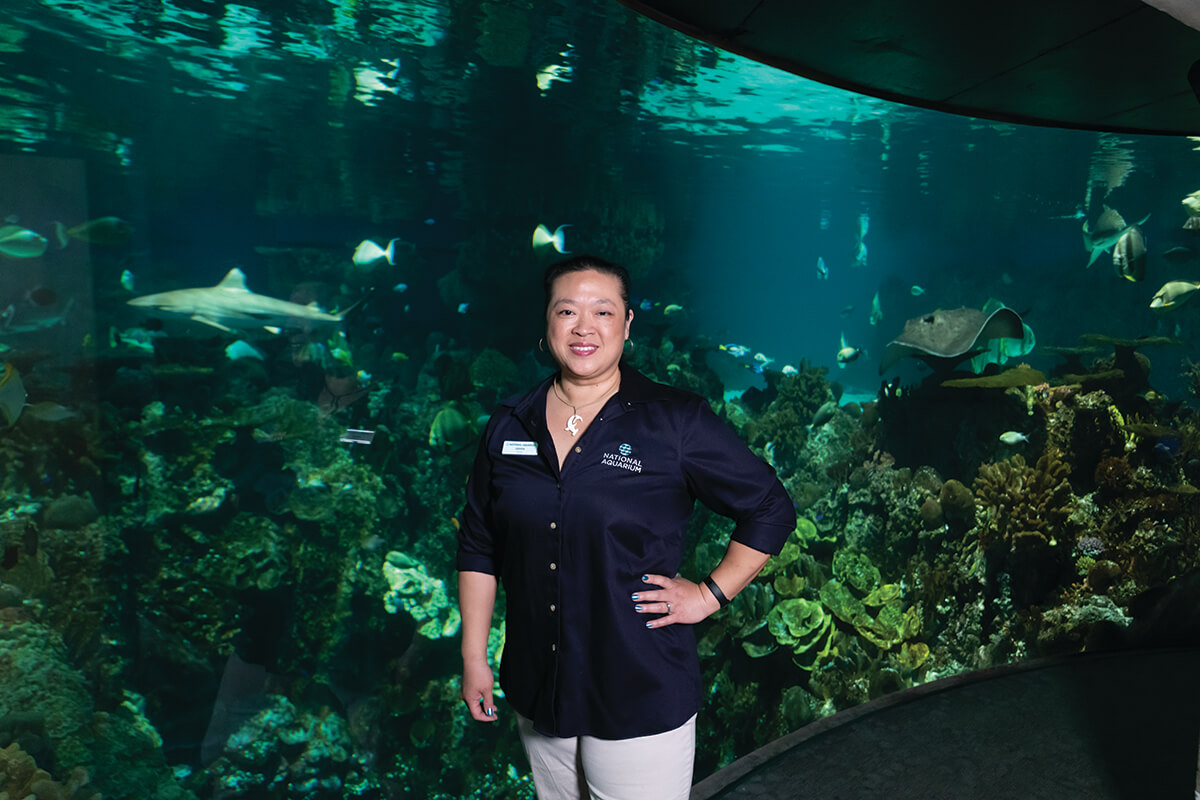GameChangers
Jennie Janssen is Expanding Access for Minorities in Aquarium and Zoo Science
The assistant curator at the National Aquarium co-founded a nonprofit that provides professional networks, career resources, and scholarship opportunities.

When Jennie Janssen saw a television show about sharks as a kid, her initial reaction was not fear, but fascination. The Silver Spring native dreamed of one day working with these infamously finned fish. Today she’s the assistant curator of the Blue Wonders exhibit at the National Aquarium, where she and her team oversee sharks, skates, rays, jellyfish, and more.
Throughout her career, however, she noticed the staff in her field was not as diverse as the animals. So in 2021, Janssen, who is Chinese-American, co-founded Minorities in Aquarium and Zoo Science (MIAZS) with her colleague, Meghan Holst, an octopus scientist at UC Davis. The nonprofit, which has 182 members and counting, provides access to professional networks, career resources, and scholarship opportunities.
You started your career in the South, most recently at the Georgia Aquarium. When you moved here over a decade ago, what made the National Aquarium enticing to you?
My husband and I are both from Maryland. He grew up in Baltimore, behind the old Memorial Stadium. This was our hometown aquarium. My family would go all the time. I remember standing inside Shark Alley, watching the sand tigers swim by. There was something electric, watching them—they’re so slow and right in front of your face; they gave me the willies! But they’re also beautiful and powerful. That was pivotal for me.
Throughout your education and career, mentorship played an important role for you, with certain professors inspiring you to pursue your passion. When did you realize that knowledge sharing was a strength of yours as well?
In college, I realized that there is the learning of knowledge, there is the use of knowledge, and then there’s the teaching of knowledge. There came a point where I thought, I can learn this, and I can do this, but if I don’t share it with anybody else, how much good is it doing?…My mentor at the Tennessee Aquarium was a turning point for me, the environment he created. [He would say,] “Don’t let anybody tell you that you are too young to do this work. And don’t be limited by what has been done before. Do the best that you can do….”
My family was very distraught about me having this unpaid internship, rightly so, but he wrote to them on official letterhead and told them about the work I was doing. It changed their support—and paved the way for me.
In 2021, you co-founded MIAZS. Tell me about your experience witnessing a lack of diversity in your field.
Throughout my career, the vast majority of people that I encountered were white. I love these people, they are my professional family, but there were almost no other people of color. Getting into our field is tricky in and of itself. There are all kinds of challenges. Then when none of the people mentoring you [look like you]….And on top of that, there are a variety of cultures that say this is not a career you should pursue like immigrant families, where there’s pressure to be a doctor, or engineer, or lawyer. And then there’s the socio-economic divide within this country.
As you alluded to, this can be a career of passion, which isn’t practical for everyone. How does MIAZS aim to address this?
There’s a level of access to even begin. And part of what we’re trying to do with MIAZS is demystify the process of getting into these careers. We’re trying to identify how managers are selecting candidates. What do they like to see on a résumé? What resources do they trust? What programs are out there? And then in turn, we work with aspiring professionals on their résumés and cover letters.
You’re never going to get the job without the interview, and if your résumé doesn’t get you the interview, it doesn’t matter. How do you find all of that out? By having a network. So we created one….Across the board, it’s about access. We want the information to be out there. And there’s no membership fee because we don’t want a financial barrier to be part of this community. And the community that has been created through MIAZS is incredibly humbling. Last fall, the Association of Zoos and Aquariums had its annual conference and there were so many MIAZS members there, from all over.
This year, you’re launching a new professional development scholarship that includes coaching and a capstone project. What inspired this program?
There are only a few opportunities for managerial training within our professional circles. And it’s something that’s really helpful in this career, because if you’re really good at taking care of animals, eventually you become a people manager, too. And it’s like, I have a lot of experience with sharks and rays and jellyfish, but I don’t know about primates. In terms of job training, often you are just perpetuating what came before you. So to intentionally think about: What are some tools and best practices for working with homo sapiens, and for being a good and effective leader to support your people so that they can support the animals? The managers are the ones who are hiring the next generation.
What’s a long-term goal for MIAZS?
Our dream is to start a program that connects with middle-schoolers. That’s the age where they’re dreaming about what they want to be when they grow up. We want them to know these are legitimate careers. And that there’s a variety of kinds of people who do this work, all to support that larger mission of the conservation of animal species and their habitats.